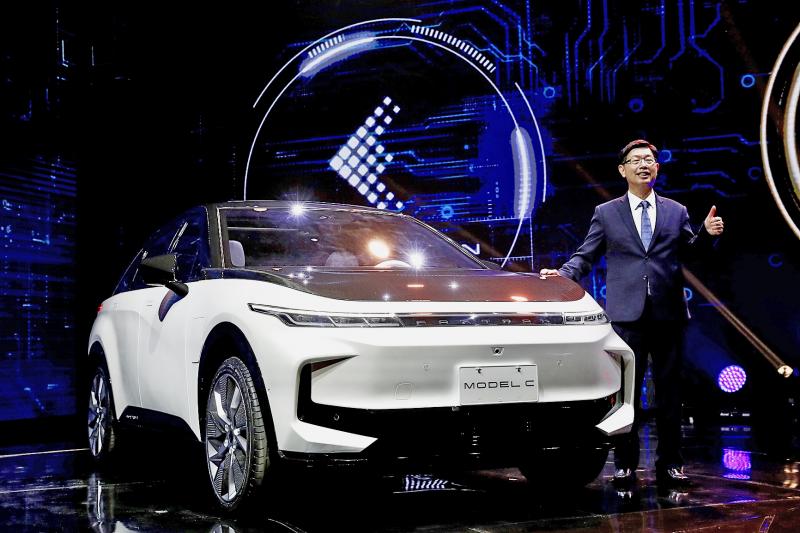Taiwan-based manufacturing giant Hon Hai Precision Industry Co (鴻海精密), which unveiled three electric vehicles (EVs) on Monday, expects its EV business to generate NT$1 trillion (US$35.8 billion) in sales for the group in five years.
Speaking to reporters after the introduction of the three EV prototypes, Hon Hai chairman Young Liu (劉揚偉) said that the company, known as Foxconn Technology Group (富士康科技集團) globally, expects its EV business to begin generating revenue next year at the earliest.
Sales momentum is expected to pick up in 2023 and revenue could potentially reach NT$1 trillion in five years, Liu said.

Photo: Ritchie B. Tongo, EPA-EFE
At the Hon Hai Tech Day on Monday, the iPhone assembler launched three self-developed EV models: a Model C sports utility vehicle, a flagship Model E passenger car and a Model T electric bus.
The venture, named Foxtron Vehicle Technologies Co (鴻華先進), is a collaboration between Hon Hai and Yulon Motor Co (裕隆汽車).
Foxtron is promoting the company’s MIH Open Platform for EV development, as Hon Hai aims to transform the platform into the “Android of the electric vehicle industry” in its bid to penetrate the global EV market.
As of June, more than 1,680 companies had joined the platform, including Bosch and Continental AG — both of which manufacture automotive parts — and tech giants Microsoft Corp and Oracle Co.
The open platform is expected to provide business opportunities to the members, Liu said.
In February, Hon Hai announced that it had joined forces with Fisker Inc, a US EV maker, to build a new EV model under the US brand, with the goal of starting mass production by the fourth quarter of 2023.
While Fisker has its own EV platform, if the MIH Open Platform could provide competitive solutions in chassis production, Liu said that he expects the US brand to consider switching platforms.
The EV business is so huge that Hon Hai plans to manufacture its EVs regionally, with plants in the US, South America, Europe, the Middle East, India, Southeast Asia, East Asia and China, while using the common auto chassis from the platform, he said.
The diversification of manufacturing allows Hon Hai to cater to different markets and lower production costs, Liu added.

SELL-OFF: Investors expect tariff-driven volatility as the local boarse reopens today, while analysts say government support and solid fundamentals would steady sentiment Local investors are bracing for a sharp market downturn today as the nation’s financial markets resume trading following a two-day closure for national holidays before the weekend, with sentiment rattled by US President Donald Trump’s sweeping tariff announcement. Trump’s unveiling of new “reciprocal tariffs” on Wednesday triggered a sell-off in global markets, with the FTSE Taiwan Index Futures — a benchmark for Taiwanese equities traded in Singapore — tumbling 9.2 percent over the past two sessions. Meanwhile, the American depositary receipts (ADRs) of Taiwan Semiconductor Manufacturing Co (TSMC, 台積電), the most heavily weighted stock on the TAIEX, plunged 13.8 percent in

A wave of stop-loss selling and panic selling hit Taiwan's stock market at its opening today, with the weighted index plunging 2,086 points — a drop of more than 9.7 percent — marking the largest intraday point and percentage loss on record. The index bottomed out at 19,212.02, while futures were locked limit-down, with more than 1,000 stocks hitting their daily drop limit. Three heavyweight stocks — Taiwan Semiconductor Manufacturing Co (TSMC, 台積電), Hon Hai Precision Industry Co (Foxconn, 鴻海精密) and MediaTek (聯發科) — hit their limit-down prices as soon as the market opened, falling to NT$848 (US$25.54), NT$138.5 and NT$1,295 respectively. TSMC's

TARIFFS: The global ‘panic atmosphere remains strong,’ and foreign investors have continued to sell their holdings since the start of the year, the Ministry of Finance said The government yesterday authorized the activation of its NT$500 billion (US$15.15 billion) National Stabilization Fund (NSF) to prop up the local stock market after two days of sharp falls in reaction to US President Donald Trump’s new import tariffs. The Ministry of Finance said in a statement after the market close that the steering committee of the fund had been given the go-ahead to intervene in the market to bolster Taiwanese shares in a time of crisis. The fund has been authorized to use its assets “to carry out market stabilization tasks as appropriate to maintain the stability of Taiwan’s

STEEP DECLINE: Yesterday’s drop was the third-steepest in its history, the steepest being Monday’s drop in the wake of the tariff announcement on Wednesday last week Taiwanese stocks continued their heavy sell-off yesterday, as concerns over US tariffs and unwinding of leveraged bets weighed on the market. The benchmark TAIEX plunged 1,068.19 points, or 5.79 percent, to 17,391.76, notching the biggest drop among Asian peers as it hit a 15-month low. The decline came even after the government on late Tuesday authorized the NT$500 billion (US$15.2 billion) National Stabilization Fund (國安基金) to step in to buoy the market amid investors’ worries over tariffs imposed by US President Donald Trump. Yesterday’s decline was the third-steepest in its history, trailing only the declines of 2,065.87 points on Monday and